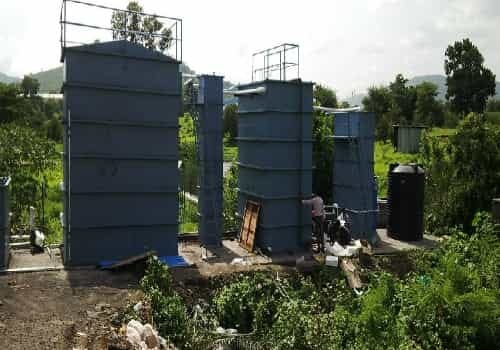ETP For Food Industry

ETP for food industry – Effluent refers to wastewater or liquid waste generated during various processes involved in food production. This wastewater can contain a variety of substances, including organic matter, nutrients, chemicals, and other contaminants that need to be treated before being discharged into the environment or municipal sewage systems. The effluent from the food industry can result from activities such as washing, cleaning, processing, and cooking food, as well as the cleaning of equipment and facilities.
Primary functions and purposes of an ETP in the food industry:
Wastewater Treatment:
Removal of Solid Particles: The ETP removes suspended solids through processes like sedimentation or filtration.
Biological Treatment: Organic matter in the wastewater is broken down by microorganisms in aerobic or anaerobic treatment processes.
Nutrient Removal:
Nitrogen and Phosphorus Removal: Some food processing effluents may contain high levels of nitrogen and phosphorus, which need to be reduced to meet environmental standards.
pH Adjustment:
Neutralization: The pH of the wastewater is adjusting to meet regulatory requirements. Food processing can often result in acidic or alkaline wastewater.
Chemical Treatment:
Chemical Precipitation: Certain chemicals may be adding to facilitate the precipitation of contaminants, making it easier to separate them from the water.
Disinfection:
Pathogen Removal: Disinfection processes, such as chlorination or ultraviolet (UV) treatment, may be employed to eliminate harmful microorganisms from the wastewater.
Sludge Handling:
Sludge Dewatering: The solids separated during treatment are often in the form of sludge. The ETP may include processes for dewatering and handling this sludge.
Compliance with Environmental Regulations:
Legal Compliance: ETPs in the food industry are designing to ensure that the treating wastewater meets local and national environmental regulations before being discharge.
Water Reuse:
Recovery of Treated Water: In some cases, treated water may be suitable for reuse within the facility for non-potable purposes, reducing overall water consumption.
Importance of ETP in Food Industry
ETPs are essential in the food industry for several reasons. They help in complying with environmental regulations by ensuring that the wastewater from food processing plants meets acceptable standards before being releasing into rivers or streams. By removing contaminants such as organic matter, suspended solids, and harmful chemicals, ETPs prevent pollution and protect aquatic ecosystems.
ETPs contribute to sustainable water management within the food industry. They enable recycling and reuse of treated water for various purposes like irrigation or cooling processes. This not only conserves precious freshwater resources but also reduces dependency on external sources.
Effluent Treatment Plant helps enhance operational efficiency in food processing plants. By treating wastewater on-site rather than relying on external treatment facilities or discharging untreated effluent directly into sewers, companies can avoid fines and penalties while maintaining their reputation as responsible corporate citizens.
The importance of ETPs in the food industry cannot be overstated. They ensure compliance with environmental regulations while promoting sustainability and efficiency within operations – all while offering economic benefits for companies involved in food processing.
Benefits of Using ETP for Food Industry
It helps in reducing environmental pollution by effectively treating and disposing of the wastewater generated during various processes. This ensures that harmful pollutants and contaminants are removing before they are releasing into water bodies or soil.
Using ETPs promotes sustainability within the food industry. By efficiently managing and reusing water resources, companies can reduce their overall water consumption and minimize their impact on freshwater sources.
ETPs also contribute to cost savings for food manufacturers. By recycling treated water for non-potable purposes such as cleaning or irrigation, businesses can significantly decrease their reliance on fresh water supplies, resulting in reduced operational expenses.
ETP helps companies comply with regulatory standards related to wastewater management. By ensuring proper treatment of effluents before discharge, organizations can avoid legal penalties and maintain a good reputation among customers and stakeholders.
ETPs also improves the overall hygiene and cleanliness of production facilities. Proper disposal of wastewater eliminates foul odors and reduces the risk of contamination from untreated effluents.
Incorporating an efficient ETP system into the food industry not only safeguards the environment but also offers economic advantages through resource conservation and compliance with regulations. It is a win-win solution that enhances both environmental sustainability and business profitability.
Conclusion
The implementation of an Effluent Treatment Plant (ETP) is crucial for the food industry. With its ability to treat and remove harmful pollutants from wastewater, ETP plays a vital role in ensuring environmental sustainability and regulatory compliance.
The food industry generates a significant amount of effluent that contains organic matter, chemicals, oils, and other contaminants. Without proper treatment, this wastewater can cause serious damage to ecosystems and human health. However, by utilizing ETP systems specifically designed for the food industry’s unique requirements, companies can effectively manage their wastewater while minimizing their environmental impact.
By implementing an ETP in the food industry, several benefits are realizing. It reduces water pollution by treating effluent before it is discharging into water bodies or reused within the facility. This not only protects aquatic life but also safeguards public health as contaminated water poses risks if consumed or used for irrigation purposes.